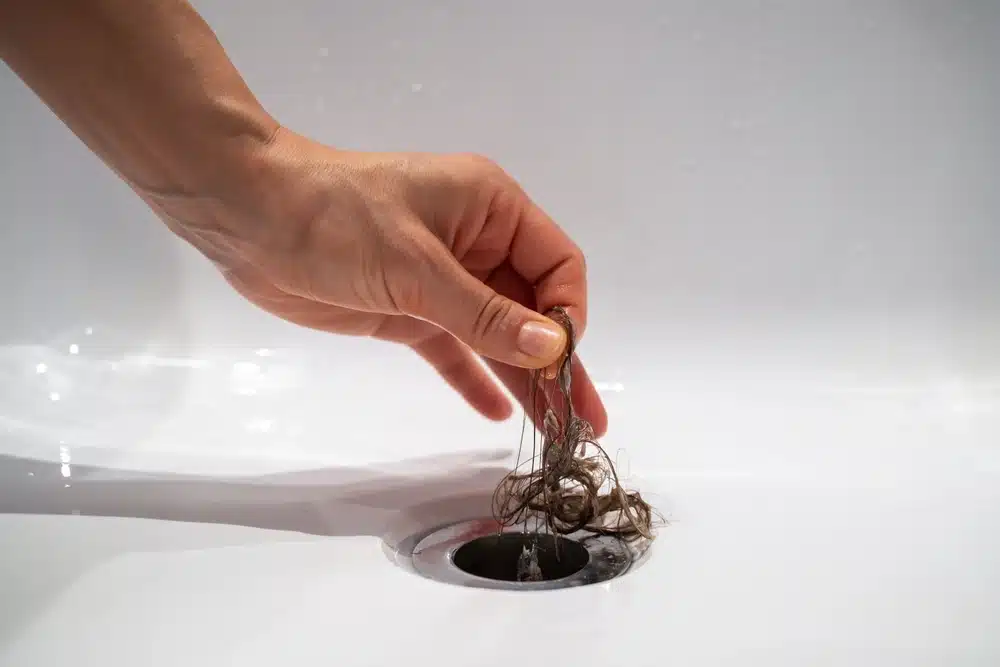Omega-3 fatty acids are known as healthy fats and are a crucial part of a person’s diet, as they help support overall health. They can even help maintain healthy hair – while omega-3 deficiencies don’t directly cause hair loss, the deficiency may contribute to brittleness, weak strands, and poor scalp health. Restoring omega-3 fatty acid levels through either diet or supplements can help promote stronger, healthier hair.
- What is Omega-3? Omega-3 refers to specific fatty acids that must be obtained through either diet or supplements. Omega-3s support normal body functions in several ways, including reducing inflammation, supporting hormonal balance, and forming cell membranes.
- How Does Omega-3 Boost Hair Growth? Omega-3 reduces inflammation, which helps boost scalp health. Omega-3 fatty acids also help provide the scalp with adequate protein and nutrient absorption, which gives the follicles what they need to grow healthy hair. Plus, omega-3 may even help with hormone regulation, which may help balance factors related to hair thinning.
- What Are the Risk Factors of an Omega-3 Deficiency? It’s all about diet. Those who have a low dietary intake, eat a vegan or vegetarian diet, or do not eat much seafood are at a higher risk of developing an omega-3 deficiency.
- What Are the Signs of an Omega-3 Deficiency? The most common signs include fatigue, dry and brittle hair, dry skin, concentration difficulties, and forgetfulness.
When looking into healthy hair habits, you will likely come across various vitamins and supplements that claim to restore your hair’s thickness and length. One common ingredient in these hair growth supplements is omega 3, an essential fatty acid found in many different types of foods, particularly oily and fatty fish. So, is it true – is omega 3 good for hair? If your hair isn’t as luscious, shiny, and dense as it once was, should you be taking an omega-3 supplement or increasing how much you get in your diet? Keep reading to find out more!
All About Omega 3
Omega 3 isn’t just one thing; it’s a collection of fats essential to keep your body healthy. The three main types of omega-3 are alpha-linolenic acid (ALA), eicosapentaenoic acid (EPA), and docosahexaenoic acid (DHA). [1] ALA is found in plant oils, while you can find EPA and DHA in a range of seafood, including oily fish. All these fatty acids play a crucial role in supporting your body’s health, with their main benefit being keeping your heart and blood vessels healthy.
Most people can get enough Omega 3 to stay healthy simply through diet. However, those who may be low in these fatty acids can take a supplement to ensure optimal health.
Omega 3 Benefits for Hair
Now, onto the omega 3 benefits for hair. Can it be used as a hair loss treatment? The reality is that there is not enough evidence to link omega 3 with hair growth, but there have been studies to show it may increase hair health and regrowth in some people. In one study on a group of women, [2] omega 3&6, alongside other antioxidants, was given to 124 subjects. The results showed a reduction in telogen hair and hair loss as a whole. There was also an improvement in hair diameter and density in the majority of participants.
There is also some opposing evidence, with a study from 2022 [3] showing that consumption of high amounts of fish oil in mice led to a significant amount of hair loss. Again, more evidence is needed here, and it’s worth noting that the same result has not been seen in humans.
It’s generally considered that omega-3 can help with hair growth in people who may be low in these fatty acids, as it provides essential proteins and nutrients that help keep the scalp and hair follicles healthy. There’s also the idea that omega 3 reduces inflammation, so if a person has inflammation-caused hair loss, omega 3 may be able to reverse that.
There’s some anecdotal evidence to consider, too, with many people who take omega 3 topically on their hair stating that the introduction to their diet led to shinier-looking hair. So, it might be beneficial in more than one way. All these potential benefits lead to many people going to their local store and purchasing fish oil supplements with the hope they will promote hair growth.
Adding More Omega 3 to Your Diet: Food vs Supplements
If you want to take advantage of the potential omega 3 benefits for hair loss, you have two main methods: food or supplements. Generally, it’s best to opt for increasing your amount of omega 3 through food rather than pills due to potential side effects, although omega 3 supplements can be very helpful for some individuals.
Omega 3 Supplements
Omega 3 supplements are sold in various shops, such as supermarkets and pharmacies. The dose ranges from 200-4000mg, but typically, you shouldn’t go over 1000mg per day, especially if it hasn’t been recommended by your doctor. There are many different types of omega-3 supplements on the market to choose from, some with pure omega-3 fatty acids and others combined with other nutrients and antioxidants.
Omega 3 in Food
Unless your doctor instructs you to take fish oil supplements, it’s best to increase your omega 3 through food sources, which there are many. Even if you don’t eat fish, you can still get plenty of omega-3 through your diet alone. Here are the foods highest in omega-3s:
- Mackerel
- Cod Liver Oil
- Algal Oil
- Salmon
- Chia Seeds
- Seaweed
- Flaxseeds
- Shellfish
- Canola Oil
- Soybeans
- Walnuts
As you can see, people with all sorts of dietary requirements can increase the amount of omega-3 in their diets.
Side Effects of Omega-3 Supplements
While omega-3 supplements are easy to take, making them popular with people wanting to improve their hair health, be aware that they can cause some side effects. These often aren’t too serious, and omega 3 pills are not considered dangerous, but it’s still important to know what to potentially expect before consuming any new supplement.
- Bad Breath
- Unpleasant-smelling Sweat (like fish)
- Gastrointestinal Problems
- Headaches
In some cases, consuming too much omega-3 can lead to even more serious problems, including high blood pressure, low blood pressure, stroke, and vitamin A toxicity. [4] Rest assured, these symptoms are not common, and you would likely have to take a lot of omega 3 to see them occur – in some, like a stroke, these symptoms have only been seen in the case of animals. In any case, it’s always worth speaking with a medical professional before introducing a new supplement into your diet, especially one with potentially dangerous side effects.
Applying Omega 3 Topically
You can also apply omega 3 topically – as mentioned, some anecdotal evidence suggests that it may lead to shiner, more luscious locks. If you do this, find a haircare product with omega 3 as an ingredient and minimise use. If you use too much, you could clog pores and even your hair follicles, leading to hair loss.
How Long Will It Take to See Hair Growth from Omega 3?
If you take omega 3 for hair, you’ll naturally want to know how long it will take before hair growth. Like with most supplements, you should spend at least three months taking them regularly before looking for evidence of them working. It’s not a super quick solution, as hair doesn’t grow overnight, so wait a few months before deciding whether (or not) omega 3 works for you.
Should You Take Omega 3 for Hair Loss?
When considering taking omega 3 for hair loss, it’s a good idea to ask yourself some questions:
Do You Have an Omega 3 Deficiency?
Omega-3 supplements make the most sense when someone has an omega-3 deficiency. Some symptoms of an omega-3 deficiency include dry eyes, joint pain, skin irritation, brittle nails, poor concentration, fatigue, depression, and thin, dull hair. If you exhibit these symptoms, it’s best to speak with your doctor to determine whether you have a deficiency and, if so, begin taking supplements or boosting the omega-3 foods in your diet. Hopefully, this will also help with any hair loss issues, assuming the deficiency is the case.
Do You Know What’s Causing Your Hair Loss?
If you know what’s causing your hair loss, that’s what you should be tackling. For example, if you have experienced hair loss due to a very stressful event, omega-3 supplements might not be the best course of action, especially if your diet already contains a lot of fatty fish oils. To help you understand your hair loss, consider booking an appointment with a dermatologist and using a hair track app.
Have You Considered Other Hair Loss Solutions?
Omega 3 isn’t usually the first hair restoration solution most people look to, as it only really works well if you aren’t already getting enough omega 3 in your diet – not to mention that there isn’t quite enough evidence to show that, without a doubt, omega-3 boosts hair growth. Other hair loss solutions may be more beneficial, such as hair growth medications like minoxidil and finasteride, which have been scientifically proven to stimulate hair growth in patients. Speak to your doctor if you’re interested in a solution like this.
For those with androgenetic alopecia – male and female pattern hair loss – there is also the option of a hair transplant. Hair transplants have become more popular over the years thanks to the more refined methods surgeons use. Patients experience a lot of hair growth in six months where they were previously balding and thinning. It has a very high success rate with thousands of documented successful cases, making it much more reliable for hair loss compared to a supplement like fish oil.
Omega 3 Benefits for Hair Strength: In Summary
Omega 3 may help with hair growth, but there is little evidence. If you don’t get enough omega 3 in your diet, it’s a good idea to incorporate more foods like fish, shellfish, walnuts, and chia seeds for your health overall. If you want to take omega-3 supplements, it’s best to speak with your doctor first, as it might be a waste if you do not have a deficiency.
Are you interested in a more focused form of hair restoration? At Harley Street Hair Clinic, we have helped many patients achieve restored confidence and a full head of hair, and you could be next. Check out our patients gallery to see what our treatments are capable of.
Sources:
- https://ods.od.nih.gov/factsheets/Omega3FattyAcids-Consumer/#:~:text=Omega%2D3%20fatty%20acids%20are,and%20docosahexaenoic%20acid%20(DHA).
- https://pubmed.ncbi.nlm.nih.gov/25573272/
- https://www.the-scientist.com/fish-oil-in-diet-can-cause-hair-loss-in-mice-study-finds-70901
- https://www.healthline.com/nutrition/fish-oil-side-effects




